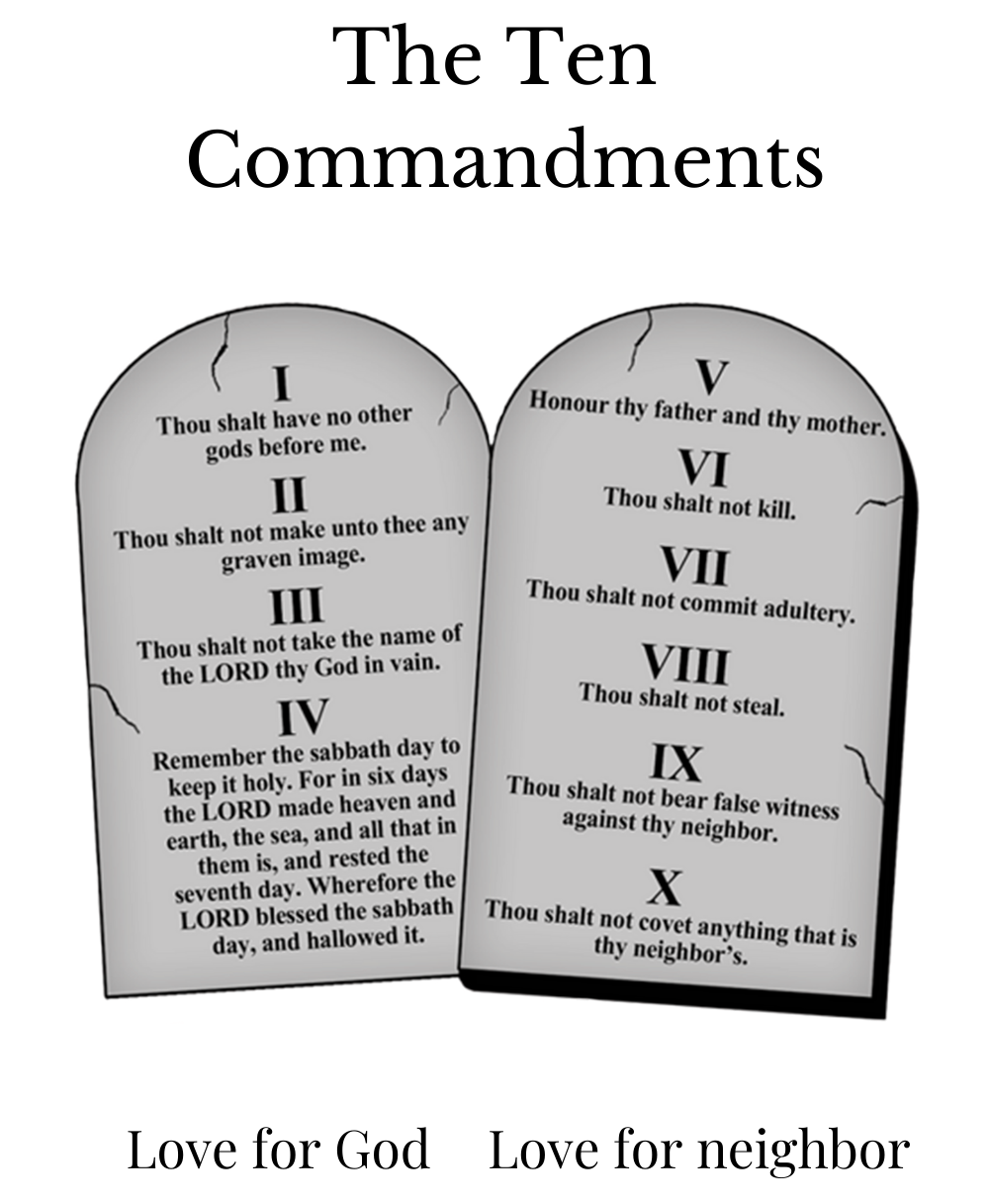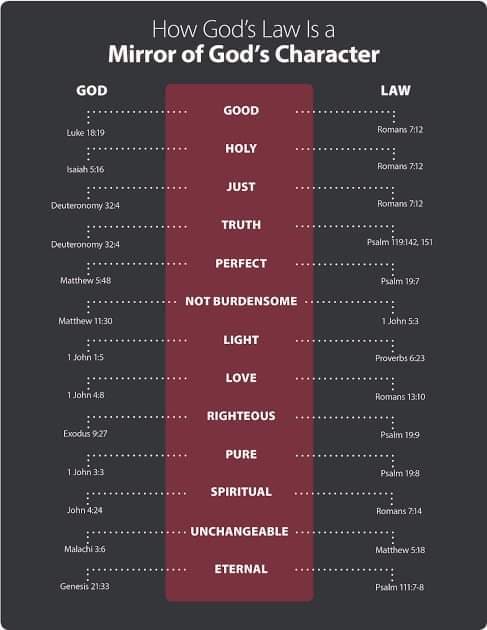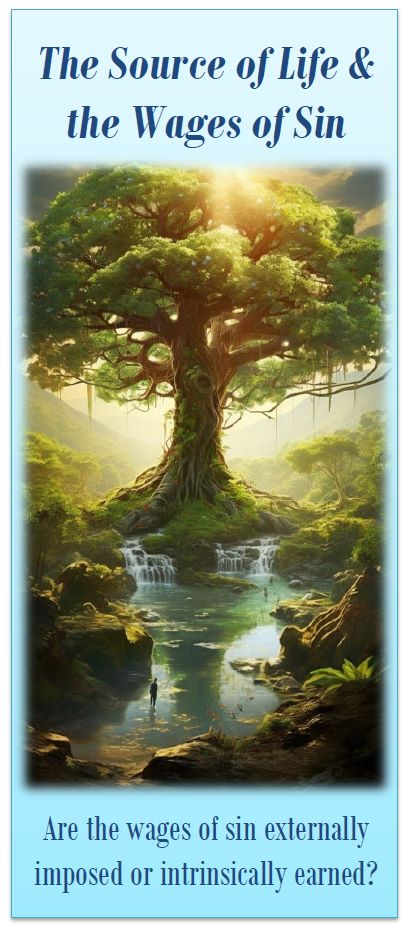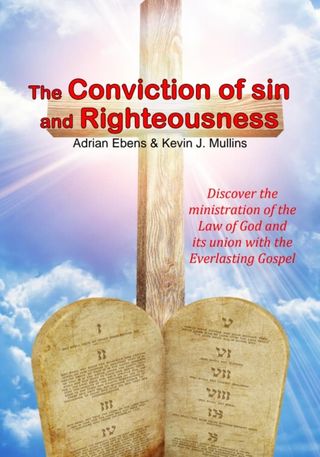(Isaiah 51:6-7) What is the Relationship Between God’s Righteousness and His Law?
“Lift up your eyes to the heavens, and look upon the earth beneath: for the heavens shall vanish away like smoke, and the earth shall wax old like a garment, and they that dwell therein shall die in like manner: but My salvation shall be for ever, and My righteousness shall not be abolished. Hearken unto Me, ye that know righteousness, the people in whose heart is My Law; fear ye not the reproach of men, neither be ye afraid of their revilings.” (Isaiah 51:6, 7)


 We see here that God’s righteousness is forever. It will never be abolished. The life of righteousness is the only life that’s everlasting. When Jesus promises you “everlasting life” He is not merely promising that you will never die. His focus is not to arouse any selfish ambitions to simply live forever, but is speaking of a lifestyle that reflects the Father’s righteousness. This righteousness is transcribed for us in His Law — “Hearken unto Me, you that know righteousness, the people in whose heart is My Law.” Here “righteousness” and “Law” are referring to the same thing. When the Law is truly in our hearts we will “know” (experience) the Father’s everlasting life of righteousness. God’s Law cannot be abolished no more than His righteousness can be.
We see here that God’s righteousness is forever. It will never be abolished. The life of righteousness is the only life that’s everlasting. When Jesus promises you “everlasting life” He is not merely promising that you will never die. His focus is not to arouse any selfish ambitions to simply live forever, but is speaking of a lifestyle that reflects the Father’s righteousness. This righteousness is transcribed for us in His Law — “Hearken unto Me, you that know righteousness, the people in whose heart is My Law.” Here “righteousness” and “Law” are referring to the same thing. When the Law is truly in our hearts we will “know” (experience) the Father’s everlasting life of righteousness. God’s Law cannot be abolished no more than His righteousness can be.
But without the righteousness of God Scripture is clear:
“As it is written, There is none righteous, no, not one: There is none that understandeth, there is none that seeketh after God. They are all gone out of the way, they are together become unprofitable; there is none that doeth good, no, not one.” (Romans 3:10-12)
Notice here that “righteousness” and “good” are synonymous with each other. This is a writing style among the Hebrews called Hebraic parallelism. When Scripture says our heavenly Father is “righteous” it is saying He is “good.” Jesus echoes this by saying: “Why do you call Me good? There is no one good except God alone” (Mark 10:18), and Paul wrote, “Wherefore the Law is holy, and the Commandment holy, and just, and good” (Romans 7:12).
What Does “Good” Mean?
Now, it would be dangerous for us to simply try to come up with the definition of “good” (righteousness) without using the Scriptures. Mankind defining what good and evil is, in our own fallen minds, is the result of eating from the tree of knowledge of good and evil. We will only co-mingle good and evil together.
“Woe unto them that call evil good, and good evil; that put darkness for light, and light for darkness; that put bitter for sweet, and sweet for bitter! Woe unto them that are wise in their own eyes, and prudent in their own sight!” (Isaiah 5:20, 21)
God is the complete opposite of evil and darkness; for “God is light, and in Him is no darkness at all” (1 John 1:5). The presence of both good and evil is NOT a balanced universe. Since God is perfect love, He only does what is right (righteous) and good. He is absolute truth! So be warned: “There is a way that seems right to a person, but its end is the way that leads to death” (Proverbs 14:12).
So what is “good” and “righteous”? Well, let’s go back to the beginning where God Himself first used the word “good”—at Creation. You will see in Genesis chapter one that, after every day of Creation week, God called each day “good” (righteous), then at the very end of the last day of Creation He said “very good” (righteous) and then was able to rest. Paul wrote:
“For the invisible things (righteous attributes) of Him from the creation of the world are clearly seen, being understood by the things that are made, even His eternal power and Godhead; so that they are without excuse.” (Romans 1:20)
So, the Father’s attributes (character traits) are clearly seen in Creation, and we have just learned that Creation displayed goodness (righteousness). But what was it about each day that was “good”? Well, what do each of the things He made do? What does the sun do? It GIVES light. It GIVES heat. It GIVES life and vitality to plants, beasts, and humans. What about trees? What do they do? They GIVE resting places and food for birds and other creatures. They GIVE shade. They GIVE oxygen. They GIVE color to the world. How about grass? It GIVES food for the creatures. It GIVES oxygen and cools the air. It GIVES color to the world. How about water? Water GIVES a home for sea creatures. It GIVES us healthy nutrients and cleansing. I think you get the point. The Father’s everlasting character, His righteousness, is a life of GIVING.
God’s Law is not a list of arbitrary rules that He came up with in order to keep us in line. It is not a legislative code that can be voted on and amended. God’s Law is built into the very fabric of creation.
“The construction protocol on which God built His universe is known as God’s law. And this law is the law of love, an expression of His nature and character ... A simple example of this law in action is respiration. With every breath we breathe we give away carbon dioxide (CO2) to the plants, and the plants give back oxygen to us (the law of respiration). This is God’s design for life, a perpetual circle of free giving. It is an expression of God’s character of love, and life is built to operate on it. If you break this law, this circle of giving, by tying a plastic bag over your head and selfishly hoarding your body’s CO2, you break the design protocol for life, and the result is death. ‘The wages [result] of sin is death’ (Romans 6:23). This circle of giving is the law that God constructed life to operate on.” (Dr. Timothy Jennings, The Remedy, Preface)
The conceptual meaning of “our Father” is that He is the eternal PROVIDER. He is the only SOURCE of LIFE who GIVES to all His creatures what is GOOD and needed for physical and spiritual health. Jesus taught:
“Therefore I say unto you, Take no thought for your life, what ye shall eat, or what ye shall drink; nor yet for your body, what ye shall put on. Is not the life more than meat, and the body than raiment? Behold the fowls of the air: for they sow not, neither do they reap, nor gather into barns; yet your heavenly Father feedeth them. Are ye not much better than they? Which of you by taking thought can add one cubit unto his stature? And why take ye thought for raiment? Consider the lilies of the field, how they grow; they toil not, neither do they spin: And yet I say unto you, That even Solomon in all his glory was not arrayed like one of these. Wherefore, if God so clothe the grass of the field, which to day is, and to morrow is cast into the oven, shall He not much more clothe you, O ye of little faith? Therefore take no thought, saying, What shall we eat? or, What shall we drink? or, Wherewithal shall we be clothed? (For after all these things do the Gentiles seek:) for your heavenly Father knoweth that ye have need of all these things. But seek ye first the kingdom of God, and His righteousness; and all these things shall be added (provided) unto you. Take therefore no thought for the morrow: for the morrow shall take thought for the things of itself. Sufficient unto the day is the evil thereof.” (Matthew 6:25-34)
What Is God’s Glory?
Yes, our Father is a SERVER—our PROVIDER. David wrote: “The heavens declare the glory of God, and the firmament reveals (displays) His handiwork” (Psalm 19:1). Later, David expounds on this and begins to define what this “glory” is: “The heavens proclaim His righteousness, and everyone sees His glory” (Psalm 97:6). Did you know God’s glory is His character of righteousness? Moses beseeched the Father saying, “Please show Me Your glory” (Exodus 33:18). In verse 19 God replied:
“And He said, I will make all My goodness pass before thee, and I will proclaim the name of the LORD before thee; and will be gracious to whom I will be gracious, and will show mercy on whom I will show mercy.”
What Is God’s Name?
That’s what it means to “proclaim the NAME of the LORD.” Many people today are caught up in arguments trying to figure out how to pronounce God’s name (Jehovah, Yahweh, Yahuah etc.) but the word “name” in Scripture conceptually means “character.” Proclaiming the name of the LORD (Jehovah, Yahweh, Yahuah etc.) is to proclaim His character of goodness, grace, and mercy in every word and action. Now it is true that the word “LORD” is just a title that man has put in place of God’s actual name, but what God is more interested in is the truth concerning His character. Is it not better for someone to say your name wrong, but proclaim your true character to others than it is to say your name correctly, but spread false accusations about you? In Exodus 34 we read:
“And the LORD descended in the cloud, and stood with him (Moses) there, and proclaimed the name of the LORD. And the LORD passed by before him, and proclaimed, The LORD, The LORD God, merciful and gracious, longsuffering, and abundant in goodness and truth.” (Exodus 34:5, 6)
God spoke through the prophet Ezekiel saying, “I had pity for My holy name (character), which the house of Israel had profaned among the heathen wherever they went” (Ezekiel 36:21). Here we have professed followers of God (Israel) profaning God’s character among the heathen. This was not done only by what they did, but also by what they said. It wasn’t so much about not pronouncing His name correctly, but about the things that they said concerning our Father’s character. They said things that were not true which resulted in their own actions being in opposition to His ways. They spoke and acted the way they wrongly perceived God speaks and acts. Their own actions, of not being merciful, gracious, longsuffering, and full of goodness and truth, gave a wrong reflection of whom they claimed as their God. As a result, wrong perceptions of the one true God were held and taught among the nations. Even from the time of Adam, God’s name has been profaned by the deceptions of Satan, and because of this, we have all fallen short of the glory (character) of God. This is sin; “For all have sinned, and fall short of the GLORY (character) of God” (Romans 3:23).
The first Commandment in the Ten Commandments says:
"I am the LORD thy God, which have brought thee out of the land of Egypt, out of the house of bondage. Thou shalt have no other gods before Me." (Exodus 20:2, 3)

The words "before Me" in the Hebrew mean "before My face." So, what God is saying here is for us not to put another god before His face, or not to mask God's face with another god. The Commandment is promising us that once we know the true God, we will not put a mask on God's face that makes Him look (act) like other gods, thus we will not profane His name (character). Speaking of God as one who exercises violence, force, coercion etc. is masking Him with the attributes of Satan and his demons.
Since Scripture tells us, “All unrighteousness is sin” (1 John 5:17), then righteousness is a life without sin. In 1 John 3:4 John tells us, “He who sins transgresses the Law, for sin is the transgression of the Law.” Unrighteousness is sin, and sin is transgression of God’s Law. Righteousness is living within the protective design of God’s Law, resulting in life; while sin is choosing to wander outside of its protection and healing, resulting in death.
Jesus Glorified the Father's Name
“Think not that I (Jesus) am come to destroy the Law, or the Prophets: I am not come to destroy, but to fulfill.” (Matthew 5:17)
Many false teachers today claim that God’s Law has been abolished because Jesus fulfilled the Law, and since Jesus fulfilled it, we don’t have to. However, the Greek word for “fulfill” in Matthew 5:17 is πληρόω (pleroo). Paul uses this same word in Romans 15:19 which is translated “I have fully preached (pleroo) the gospel of Messiah.” Jesus came to fulfill (fully and correctly teach), through word and action, “the Law and the Prophets” or, in other words, Jesus came to fully teach us about God’s true character as described by God’s true prophets.
“Then one of them, which was a lawyer, asked Him a question, tempting Him, and saying, Master, which is the great Commandment in the Law? Jesus said unto him, Thou shalt love the Lord thy God with all thy heart, and with all thy soul, and with all thy mind. This is the first and great Commandment. And the second is like unto it, Thou shalt love thy neighbour as thyself. On these two Commandments hang all the Law and the Prophets.” (Matthew 22:35-40)
Jesus is not speaking anything new here. The lawyer asked Him what the greatest Commandment was “in the Law” so Jesus quotes from the Law:
“And thou shalt love the LORD thy God with all thine heart, and with all thy soul, and with all thy might.” (Deuteronomy 6:5)
“Thou shalt not avenge, nor bear any grudge against the children of thy people, but thou shalt love thy neighbour as thyself: I am the LORD.” (Leviticus 19:18)
Jesus said, “On these two Commandments hang all the Law and the Prophets.” Another way of wording that is, “All the Law and the Prophets depend on these two Commandments.” The Ten Commandments are an outline on how to love God and our fellow man. All the little details on how to do this (called the jots and the tittles) are further stated throughout Scripture in God's Statutes and Judgments and explained correctly by God’s prophets; for the same prophet who instructs us on tithing (Malachi 3:9, 10) also said:
“Remember ye the Law of Moses My servant, which I commanded unto him in Horeb for all Israel, with the Statutes and Judgments. Behold, I will send you Elijah the prophet before the coming of the great and dreadful day of the LORD.” (Malachi 4:4, 5)
And through the prophet Ezekiel, God promised:
"A new heart also will I give you, and a new spirit will I put within you: and I will take away the stony heart out of your flesh, and I will give you an heart of flesh. And I will put My Spirit within you, and cause [empower] you to walk in My Statutes, and ye shall keep My Judgments, and do them." (Ezekiel 36:26, 27)
 The Ten Commandments instruct us on how to "love the Lord thy God with all thy heart, and with all thy soul, and with all thy mind" by having no other gods before Him; not making and bowing down to images; not saying His name in vain; and to keep the Sabbath holy. We have seen one way to profane God’s name is to spread lies about His character. It’s not just about saying curse words. The weekly Sabbath is designed for us to rest in His love and receive double portion blessings from His Spirit (His very presence, attitude, and life). However, throughout Scripture we read that all the other annual Sabbaths and Festivals become a channel to the weekly Sabbath source in which we receive double portion blessings throughout the year from God’s Spirit as we come together on these appointed times. Each of the principles of the Ten Commandments become a source to all the other details which magnify the source.
The Ten Commandments instruct us on how to "love the Lord thy God with all thy heart, and with all thy soul, and with all thy mind" by having no other gods before Him; not making and bowing down to images; not saying His name in vain; and to keep the Sabbath holy. We have seen one way to profane God’s name is to spread lies about His character. It’s not just about saying curse words. The weekly Sabbath is designed for us to rest in His love and receive double portion blessings from His Spirit (His very presence, attitude, and life). However, throughout Scripture we read that all the other annual Sabbaths and Festivals become a channel to the weekly Sabbath source in which we receive double portion blessings throughout the year from God’s Spirit as we come together on these appointed times. Each of the principles of the Ten Commandments become a source to all the other details which magnify the source.
The Ten Commandments instruct us on how to "love thy neighbor as thyself" by honoring our parents; not killing; not committing adultery; not stealing; not lying about others; and not coveting the things of others. However, throughout Scripture we read even more details. In Amos 8:4-7 God rebukes those who cheat the poor by “making the ephah small and the shekel large, falsifying the scales by deceit.” So, any type of deception against our fellow man goes against the principle of loving our neighbor. Thus, selling a car that you know is a lemon is not loving others. James instructs of another way to love others:
“Pure religion and undefiled before God and the Father is this, To visit the fatherless and widows in their affliction, and to keep himself unspotted from the world.” (James 1:27)
You can find these jots and tittles throughout Scripture.
Paul wrote, “Owe no man anything except to love one another; for he that loves another has fulfilled the Law.” (Romans 13:8). Again we see here that the way to fulfill the Law is to love one another. Thus when Jesus fulfilled the Law He was loving one another, and Paul tells us that we too are to fulfill the Law by loving one another. Then, after quoting a few of the Ten Commandments, to show us exactly what Law he is referring to, he concludes: “Love NEVER does anything that is harmful to its neighbor. Therefore, love is the fulfilling of the Law.” (Verse 10). In Romans chapter 8 Paul tells us that fulfilling the righteousness of the Law comes natural when we are filled with the Spirit of Christ:
“For what the Law could not do, in that it was weak through the flesh (it could not change us), God sending His own Son in the likeness of sinful flesh, and for sin, condemned sin in the flesh: That the righteousness of the Law might be fulfilled in us, who walk not after the flesh, but after the Spirit. For they that are after the flesh do mind the things of the flesh; but they that are after the Spirit the things of the Spirit. For to be carnally minded is death; but to be spiritually minded is life and peace. Because the carnal mind is enmity against God: for it is not subject to the Law of God, neither indeed can be (it cannot submit to God’s Law). So then they that are in the flesh cannot please God. But ye are not in the flesh, but in the Spirit, if so be that the Spirit of God dwell in you (therefore we can submit to God).” (Romans 8:3-9)
Do you really believe Jesus abolished love at the cross? Did Jesus abolish God’s righteousness? No, “The LORD is well pleased for His righteousness' sake; He will magnify the Law, and make it honourable” (Isaiah 42:21). This is exactly what Jesus did by fulfilling the Law – He glorified His Father’s name:
“I (Jesus) have glorified Thee (His Father) on the earth: I have finished the work which Thou gavest Me to do … I have manifested Thy name (character) unto the men which thou gavest Me out of the world … (John 17:4, 6)
As you can see, righteousness is an “others-first” life and this unselfish life only comes from God; for He is the source of all that is good and right in the world:
“Every good gift and every perfect gift is from above, and cometh down from the Father of lights, with whom is no variableness, neither shadow of turning.” (James 1:17)
God has declared: “For I am the LORD, I change not …” (Malachi 3:6). Since “God is love”, and He does “not change”, because in Him there “is no variableness, neither shadow of turning”, then you can always trust that He will NEVER do anything harmful to you because “love never does anything that is harmful to its neighbor” - even if you are His enemy! When Jesus was on the earth He proclaimed the love of our heavenly Father by saying:
“Ye have heard that it hath been said, Thou shalt love thy neighbour, and hate thine enemy. But I say unto you, Love your enemies, bless them that curse you, do good to them that hate you, and pray for them which despitefully use you, and persecute you; That ye may be the children of your Father which is in heaven: for He maketh His sun to rise on the evil and on the good, and sendeth rain on the just and on the unjust. For if ye love them which love you, what reward have ye? do not even the publicans the same? And if ye salute your brethren only, what do ye more than others? do not even the publicans so? Be ye therefore perfect, even as your Father which is in heaven is perfect.” (Matthew 5:43-48)
Notice that loving your enemies and doing good to those that hate you is being compared to the love of “your Father which is in heaven.” The reason you do these good things is because you have become “children of your Father” and that’s how your heavenly Father acts. Our Father loves His enemies and does good to all those who hate Him; “for He maketh His sun to rise on the evil and on the good, and sendeth rain on the just and on the unjust.” In Luke’s account of this, He quotes Jesus as saying, “For He is KIND unto the unthankful and to the evil.” (Luke 6:35). “In Matthew’s account Jesus concludes by saying, “Be ye therefore perfect, even as your Father which is in heaven is perfect.” In Luke’s account we read, “Be ye therefore merciful, as your Father also is merciful.” Being perfect like our Father is to show love and mercy (kindness) to those who curse us, hate us, use us, and persecute us.
We cannot do this without the Spirit of Jesus living in and through us. Christ died to fix the broken condition of fallen man and to bring us back into harmony with God and His Law of love and righteousness.

For a deeper understanding of God's Law and love see the book, Father of Love


.jpg)



